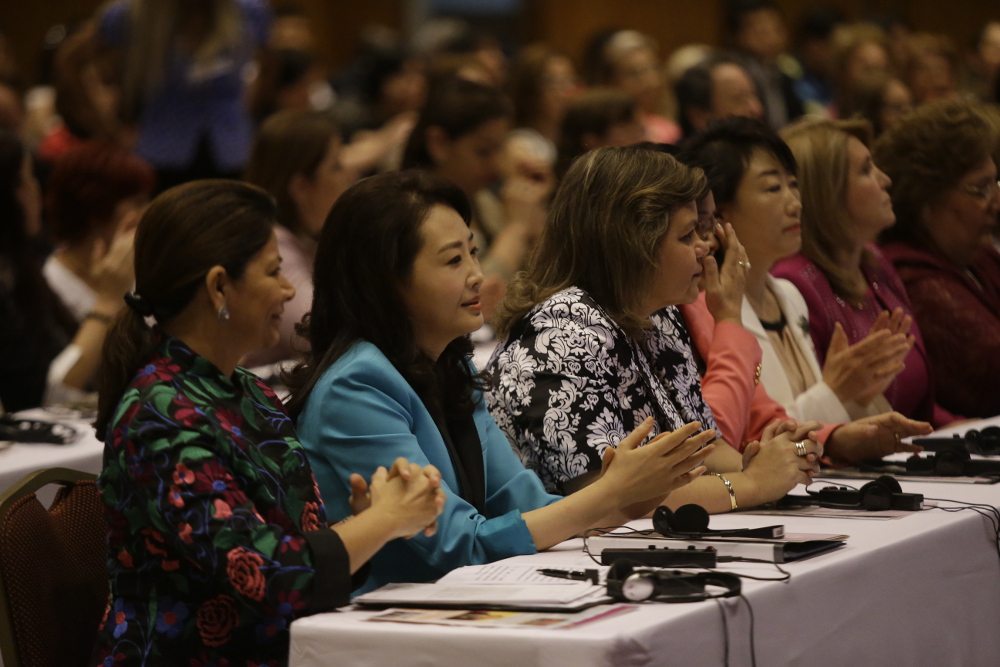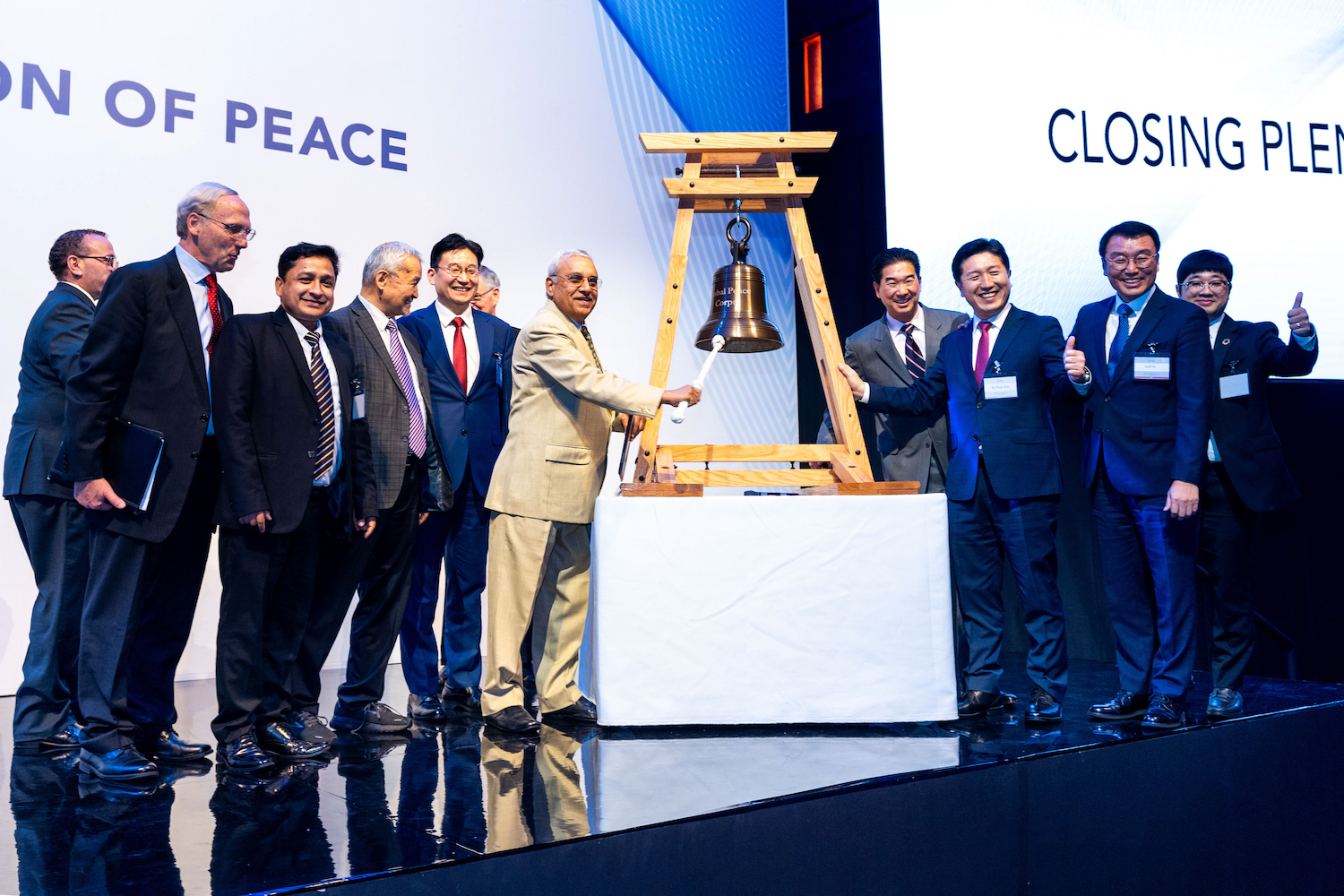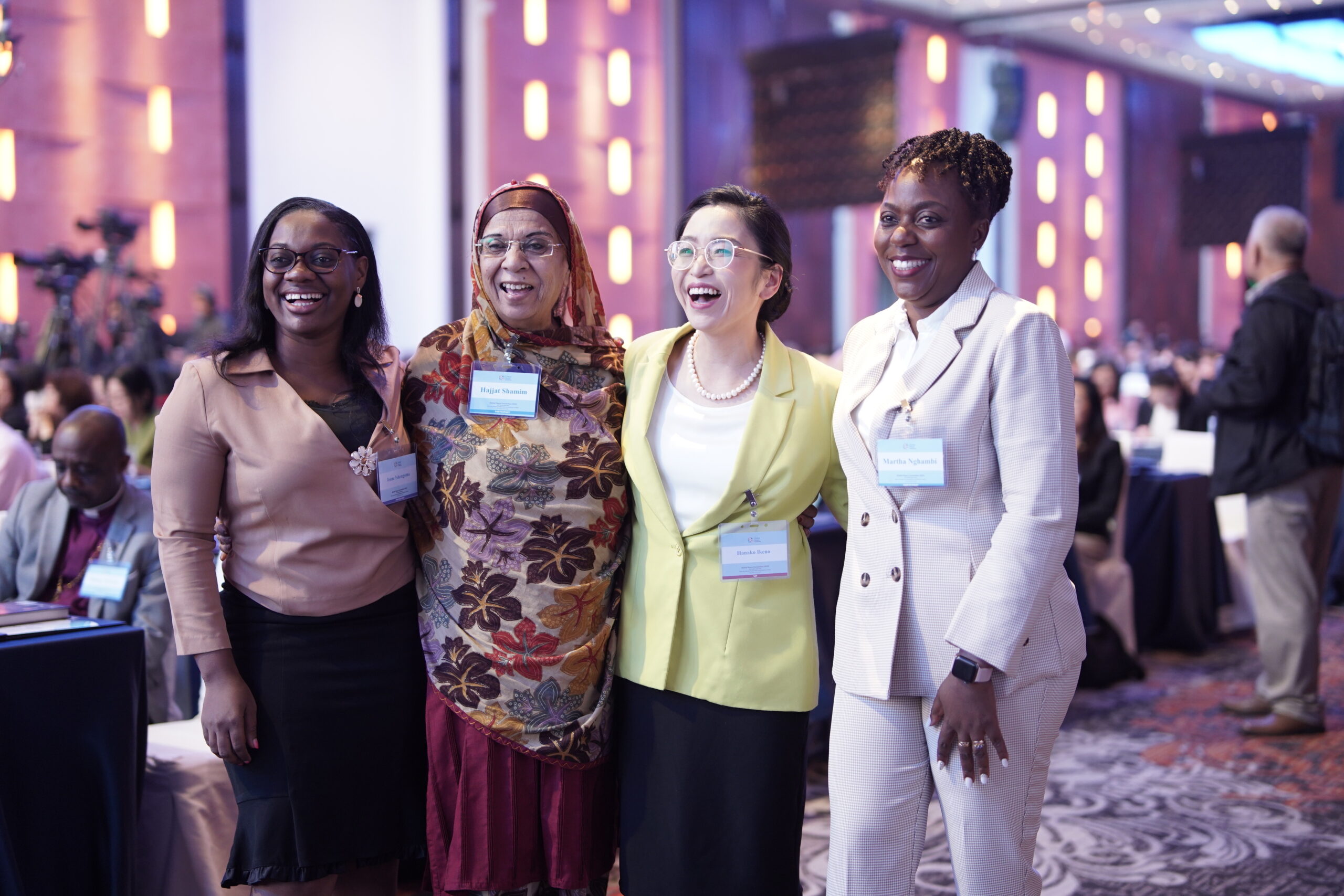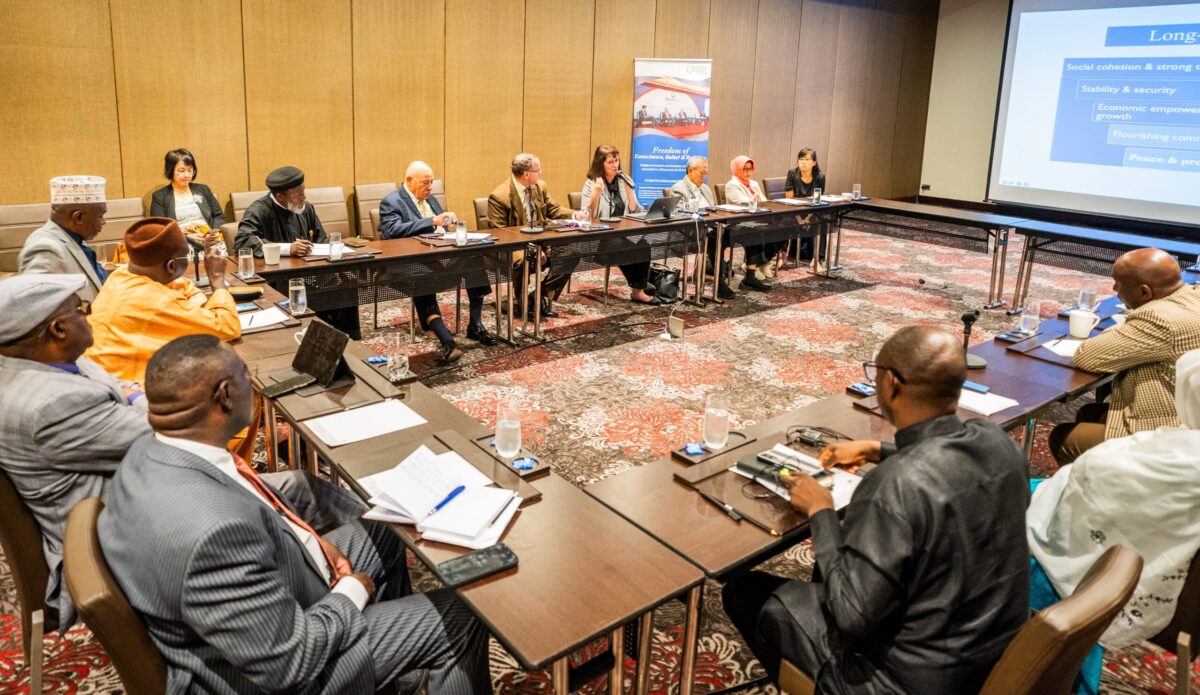Good Morning, ladies and the few gentlemen – Thank you so much for coming here to this event, the women’s session. And I’m especially delighted to see also the gentlemen also attending this session. Can I see a raise of hands for the men gathering here this morning? Gentlemen? Thank you very much. We women always feel so much more energy when we feel like the men are there to support us. So thank you very much. I am honored to be among such beautiful and accomplished women from around the world. Each time my husband and I come here to Paraguay we truly feel that we have come back to our second home.
To all the leaders here from our host nation Paraguay and from across the Latin American region, “Buenos dias y bienvenidos!” And to all our distinguished leaders from around the world, welcome to Paraguay and the 2014 Global Peace Convention.
I would like to especially recognize the former President of Costa Rica, Her Excellency Laura Chinchilla. We also have together with us, the Honorable Senator Lilian Samaniego and Dr. Haehoon Lee, the former Congresswoman of the Republic of Korea.
I would also like to recognize Governor Marlene Ocampos of Alto Paraguay, the government ministers of Paraguay, and Ana Maria Ortiz, President of the Association of Businesswomen of Paraguay, who have joined us today.
Please warmly welcome from Europe, Dr. Eva Latham, where is she? She’s the President of Human Rights Teaching International.
From the United States, Collete Caprara, editor on family issues at the Heritage Foundation, Ms. Diann Dawson, president and CEO of DDA & Associates, and Donna Schuller, where are you? She’s from our Global Peace Women advisory board. Thank you so much for coming this morning.
I would like to especially appreciate the directors of Area Mujer for all the work they are doing here in Paraguay and for hosting this great program today. The theme of this convention is, “Roadmap for National Transformation” and here in this women’s session we are discussing the theme “National Transformation – Women’s Leadership and Contributions toward Social Models That Promote Development and Wellness for All.” This topic is very close to my heart because I believe women play a critical role in the process of national transformation.
What do we mean when we speak of national transformation? What type of nations do we aspire to build? History teaches us that the strongest nations with the longest and lasting experience of peace were those built upon spiritual principles and values that gave them a higher sense of purpose to serve a greater good. We have examples from as far back as the Pax Mongolia that grew out of the Mongol empire’s aspiration to create One World under One Heaven and encouraged exchange amongst the cultures, faiths, and regions of the empire. A more recent example is the United States, the oldest and most stable democratic society, built upon the dream of forming One Nation under God. In such a nation, people of every race and land could come to enjoy equal rights and freedom of worship.
What we learn from these examples is that vibrant and enduring nations need a guiding vision and a foundation of spiritual principles and values. How is such a nation formed? It is through the moral virtues of the nation’s citizens, who embody these spiritual principles and values in their lives.

Left to right: H.E. Laura Chincilla, former president of Costa Rica, Dr. Jun Sook Moon, Chairwoman of Global Peace Women, Hon. Lilian Samaniego, national senator of Paraguay
Where do people learn these principles and values? Where do they become the “habits of the heart” of a people, where acting morally becomes as natural as breathing. I believe it is in the home and in the family. Strong nations must be built upon strong, healthy families. This makes the central role every mother plays in her family an essential component of national transformation. That is why my husband and I recently coined the Global Peace Women motto, “Peace Starts with the Home.” Can we all say that with me? “Peace Starts with the Home,” thank you.
In the home, peace is more than a concept or an ideal. It is visible, it is substantial, and can be felt emotionally, physically, spiritually. As such, it becomes a lived daily reality.
A child experiences love and learns the value of life through the unconditional embrace and untiring investment of a mother from the moment of their birth. A mother plants the seed of a lifestyle of self-sacrifice, and living for others by her example, as she teaches the child to share with siblings, and think about the happiness of the family as a whole. Most of all, through exemplifying spiritual principles and values, parents form the roots of faith, love for God, and for their fellow human beings in their children.
The extended family model is especially suited to nurture virtuous men and women who can lay the foundations for a culture of peace in their nations and, ultimately, the world. In an extended family, a child grows up surrounded by the richness of diverse relationships with so many different relatives. Through them they learn how to respect and honor elders while cherishing and investing in those younger than them. This is the basis of the social norms to be practiced in the wider society. Through the multitude of family interactions, a person naturally experiences the benefits of teamwork, cooperation, and harmony. Moreover, they learn how to resolve conflicts, forgive, and truly live in peace. The extended family prepares a person to relate to the diversity of the human family and live for the benefit of the whole. A beautiful example of this extended family can be found right here in a Paraguayan home. I heard that every Sunday, in a Paraguayan home, families gather around with their parents and they share asado, and talk about soccer, and have a beautiful meeting every Sunday. I think it’s such a beautiful tradition you have in Paraguay.
The inescapable conclusion is that the family is not just a private realm, set apart from the broader society but rather is an essential element of national transformation. This is what Global Peace Women champions. We must uplift the contribution of women in national transformation and emphasize the role of families, especially mothers, in forming the foundation of an ethical, prosperous society.
Once we understand that principles and values are preserved and passed on within families, then it is natural that a nation aspiring to model such principles and values should create policies and infrastructure to strengthen the family. Communities, schools, businesses, and governments, both local and national, should invest in programs that support the family unit and find innovative ways to empower the family and encourage the work of raising ethical, global citizens. This could come in the form of couple counseling benefits or parenting support programs that tackle the issues that have led to the family decline we are experiencing in so many countries today. Micro-financing initiatives like the Grameen Bank or Kiva could provide much-needed financial support to launch a family business and incentivize active participation, especially of women, in a growing economy. Failure to invest in the family is the same as doing nothing to prevent family breakdown and the high social costs that come with it. We are all too aware of the growing global trend of divorce, out-of-wedlock births, and the loss of moral standards of our youth.
Let us put our hearts and minds together to find ways to counter that global trend and protect and uplift the sanctity of family and the essential role of women in the home first and foremost, and as an extension the important contributions women make in the greater community, nation, and in our world today. I feel there is no better place to have this women’s conference than here in Paraguay. I know how active the women of GPF have been in Paraguay, supporting educational initiatives, and forums on good governance and leadership. They have also provided access to medical and dental health, food and clothing, and education and jobs to the most remote villages. This nation has great women leaders who have championed the fight against corruption and engaged government ministries in providing services to the poorest and most remote regions of Paraguay.
Here in the heart of Latin America, or as my husband calls it, the “womb” of Latin America, I believe that our work as women, through the models it creates, will bring about a sweeping spiritual awakening here in Paraguay, in Latin America, and throughout the hemisphere.
Ladies and Gentlemen, “La Paz Comienza desde el Hogar.” “Peace Begins with the Home.” Muchas gracias. May God bless you, thank you very much.
*Jun Sook Moon is Chairwoman of Global Peace Women, her husband, Dr. Hyun Jin Moon is founder and Chairman of the Global Peace Foundation.



